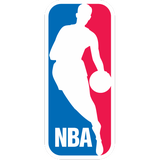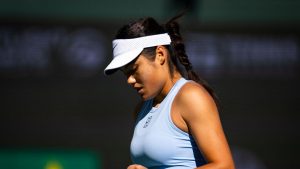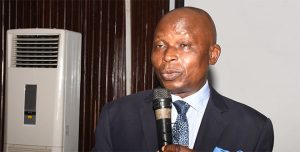Top 50 NBA players from last 50 years: Larry Bird ranks No. 7


Editor’s Note: As part of a new series for his podcast “What’s Wright with Nick Wright,” FOX Sports commentator Nick Wright is ranking the 50 best NBA players of the last 50 years. The countdown continues today with player No. 7, Larry Bird.
Larry Bird’s career highlights:
- Two-time Finals MVP
- Three-time league MVP
- 12-time All-Star
- Nine-time first-team All-NBA, one-time second team
- Three-time All-Defensive second team
- Two-time 50-40-90 club
- 1980 Rookie of the Year
There are only about a dozen players in NBA history who have separated themselves as the best in the league for a prolonged stretch. Even fewer have been regarded as the greatest of all time, even briefly.
This is the company Larry Bird keeps.
“[He] is a guy whose apex was one of the five best apexes we’ve seen in NBA history,” Wright said. “He came into the league a little old, left the league a little early. But while he was there, from the moment he stepped onto the court, was one of the best players in the league and stayed like that for a full decade.”
Larry Bird ranks No. 7 on Nick Wright’s Top 50 list
A skilled scorer, passer, rebounder and clutch performer, Larry Bird is No. 7 on Nick Wright’s list of the Top 50 NBA Players of the Last 50 Years. Bird was a three-time MVP, won a pair of Finals MVPs and led the Boston Celtics to five NBA Finals appearances and three NBA championships.
Bird, indeed, arrived in the NBA as a clutch, almost fully formed superstar.
The 6-foot-9 forward was close to turning 23 and immediately ready to lift the league’s most storied franchise back into title contention following a couple of down years. In Bird’s first season, 1979-80, the Celtics won 32 more games than in the previous year.
After earning a landslide victory over Magic Johnson for Rookie of the Year (and finishing fourth in the MVP race), Bird went for 34 points, 10 rebounds and seven assists against Moses Malone’s Rockets to close out his first playoff series. He dropped another 30-10 and a 20-20 in the conference finals, but Boston fell to Julius Erving’s more experienced 76ers.
The two teams would meet again in the conference finals one year later, with Bird ensuring a Celtics win. He pulled Boston out of a 3-1 hole by averaging 27-13-5 for the series, making the go-ahead basket in a Game 7 decided by a single point. He averaged 15.3 points, 15.3 rebounds, 7.0 assists and 2.3 steals in a Finals triumph over Houston, but the series MVP went to Cedric Maxwell (18-10-3).
“I think that’s a pretty questionable one for Larry not to have won it,” Wright said.
Bird only got better in the regular season but slightly faded in the next two postseasons, and Boston fell short of the Finals in both of them before replacing coach Bill Fitch with longtime assistant K.C. Jones.
Here is where Bird’s aforementioned apex began, and the term “Larry Legend” was born. While he’d been MVP runner-up the three previous seasons, his usage increased in the wake of point guard Nate Archibald’s departure. It was especially evident in the 1984 postseason. The newly minted league MVP averaged 30 PPG in the second round to out-duel Bernard King and the Knicks, including a 39-12-10 output in Game 7.
“Everyone remembers Larry Bird, the iconic scorer,” Wright said. “The first true, great, deep shooter of any era. What I think younger folks don’t understand is, he was an exceptional rebounder and one of the greatest passers ever.”
In the first part of what would become an epic trilogy with the Lakers, Bird (27-14-4) markedly outplayed Magic and Kareem Abdul-Jabbar over seven grueling games to claim Finals MVP.
In the 1984-85 season, Bird started shooting (and making) more 3s while setting new highs in points and assists to win a second straight MVP. He then dominated the early rounds of the playoffs, only to struggle from the floor in the Finals as Boston was run off the court by the Lakers, who got big performances from Kareem, Magic and James Worthy.
The following season, Bird led the league in player efficiency rating and win shares for the second year in a row and claimed a third consecutive MVP. He’s the only player to pull off the latter over the past 50 years, yet his best ball came in the postseason. He averaged 26-9-8 over four rounds with 51%/41%/93% shooting splits, as the 67-win Celtics went 15-3 to win another title and assert themselves as one of the best teams of all time.
“Those Celtics teams were great, even though they didn’t have another super-duper star,” Wright said.
That might have been Len Bias, who shockingly died just days after Boston selected him No. 2 overall in the 1986 draft. Boston took a step back in the subsequent season, even though the reigning MVP and Finals MVP was still ascending. Bird registered the first 50-40-90 campaign in league history, a feat he’d flirted with the previous two seasons and would repeat the following year.
A banged-up Boston squad struggled to get past the Bucks and Pistons in the 1987 postseason, needing every bit of Bird’s heroics to make a fourth straight Finals appearance. After averaging 30-10-7 against Milwaukee, he recorded one of the biggest steals in basketball history to give the Celtics a 3-2 lead versus Detroit. In Game 7, he dropped 37-10-7 as Boston won by three.
The ensuing Finals rubber match with the deeper Lakers wasn’t especially close, as Johnson was by far the best player in the series and Kevin McHale played on a broken foot. Bird led Boston in scoring, rebounding, steals and blocks.
He’d register his finest shooting season yet in 1987-88 (53%/41%/92%) while averaging a personal-best 29.9 points per game. It earned him another MVP runner-up and a record ninth All-NBA first-team selection to start his career.
The aging legend opened the 1988 playoffs on fire but struggled like never before in the conference finals, succumbing to the defensive brilliance of Dennis Rodman, whom he’d previously torched. Over six games, Bird shot a career-low 35% and posted just 19.8 points per game. (To be fair, he also averaged 12.2 rebounds, 6.2 assists, 2.7 steals and 1.8 blocks.)
The loss to Detroit effectually marked the end of Bird’s prime and the Celtics’ dynasty, which required a greater contribution from its best player than most others.
A worn-down Bird, who’d already been playing through serious back pain, missed nearly all of the 1988-89 season because of bone spurs in his heels. He’d average 22-9-7 over his last three seasons, while Boston won just one playoff series.
The slight decline didn’t change the fact that his career marks are unrivaled. The three-time champ averaged 24-10-6 (with 50%/38%/89% shooting splits) in the regular season and 24-10-7 in the postseason. No one else has ever hit all three of those benchmarks, with only Giannis Antetokounmpo approaching them.
Their contrast in athleticism couldn’t be starker, and it conjures a famous refrain about Bird not being able to run or jump. But oftentimes, he was the smartest and played the hardest. Don’t sleep on the self-proclaimed Hick from French Lick’s skill, either.
“It’s really just a 10-year run,” Wright said. “But what an unbelievable 10-year run.”
Get more from National Basketball Association Follow your favorites to get information about games, news and more.








